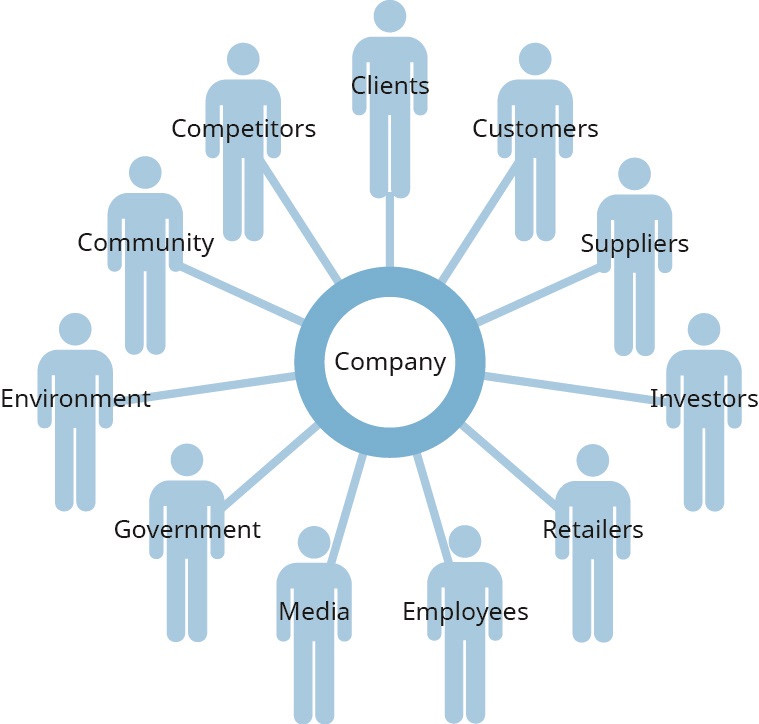1.1 Being a Professional of Integrity
LEARNING OBJECTIVESBy the end of this section, you will be able to:
Whenever you think about the behavior you expect of yourself in your personal life and as a professional, you are engaging in a philosophical dialogue with yourself to establish the standards of behavior you choose to uphold, that is, your ethics. You may decide you should always tell the truth to family, friends, customers, clients, and shareholders, and if that is not possible, you should have very good reasons why you cannot. You may also choose never to defraud or mislead your business partners. You may decide, as well, that while you are pursuing profit in your business, you will not require that all the money on the table come your way. Instead, there might be some to go around to those who are important because they are affected one way or another by your business. These are your stakeholders. |
Acting with Integrity
Clients, customers, suppliers, investors, retailers, employees, the media, the government, members of the surrounding community, competitors, and even the environment are stakeholders in a business; that is, they are individuals and entities affected by the business’s decisions (Figure 1.2). Stakeholders typically value a leadership team that chooses the ethical way to accomplish the company’s legitimate for-profit goals. For example, Patagonia expresses its commitment to environmentalism via its “1% for the Planet” program, which donates 1 percent of all sales to help save the planet. In part because of this program, Patagonia has become a market leader in outdoor gear.
| Figure 1.2 Stakeholders are the individuals and entities affected by a business’s decisions, including clients, customers, suppliers, investors, retailers, employees, the media, the government, members of the surrounding community, the environment, and even competitors. (attribution: Copyright Rice University, OpenStax, under CC BY 4.0 license) |
Being successful at work may therefore consist of much more than simply earning money and promotions. It may also mean treating our employees, customers, and clients with honesty and respect. It may come from the sense of pride we feel about engaging in honest transactions, not just because the law demands it but because we demand it of ourselves. It may lie in knowing the profit we make does not come from shortchanging others. Thus, business ethics guides the conduct by which companies and their agents abide by the law and respect the rights of their stakeholders, particularly their customers, clients, employees, and the surrounding community and environment. Ethical business conduct permits us to sleep well at night.
LINK TO LEARNINGAre business ethics an oxymoron? Read “Why Ethics Matter” to understand just a few of the reasons to have values-driven management. |
Nearly all systems of religious belief stress the building blocks of engaging others with respect, empathy, and honesty. These foundational beliefs, in turn, prepare us for the codes of ethical behavior that serve as ideal guides for business and the professions. Still, we need not subscribe to any religious faith to hold that ethical behavior in business is still necessary. Just by virtue of being human, we all share obligations to one another, and principal among these is the requirement that we treat others with fairness and dignity, including in our commercial transactions.
For this reason, we use the words ethics and morals interchangeably in this book, though some philosophers distinguish between them. We hold that “an ethical person” conveys the same sense as “a moral person,” and we do not regard religious belief as a requirement for acting ethically in business and the professions. Because we are all humans and in the same world, we should extend the same behavior to all. It is the right way to behave, but it also burnishes our own professional reputation as business leaders of integrity.
Integrity—that is, unity between what we say and what we do—is a highly valued trait. But it is more than just consistency of character. Acting with integrity means we adhere strongly to a code of ethics, so it implies trustworthiness and incorruptibility. Being a professional of integrity means consistently striving to be the best person you can be in all your interactions with others. It means you practice what you preach, walk the talk, and do what you believe is right based upon reason. Integrity in business brings many advantages, not the least of which is that it is a critical factor in allowing business and society to function properly.
Successful corporate leaders and the companies they represent will take pride in their enterprise if they engage in business with honesty and fair play. To treat customers, clients, employees, and all those affected by a firm with dignity and respect is ethical. In addition, laudable business practices serve the long-term interests of corporations. Why? Because customers, clients, employees, and society at large will much more willingly patronize a business and work hard on its behalf if that business is perceived as caring about the community it serves. And what type of firm has long-term customers and employees? One whose track record gives evidence of honest business practice.
LINK TO LEARNINGIn this interview, Mark Faris, a white-collar criminal convicted of fraud, claims that greed, arrogance, and ambition were motivating factors in his actions. He also discusses the human ability to rationalize our behavior to justify it to ourselves. Note his proposed solutions: practicing ethical leadership and developing awareness at an individual level via corporate training. |

